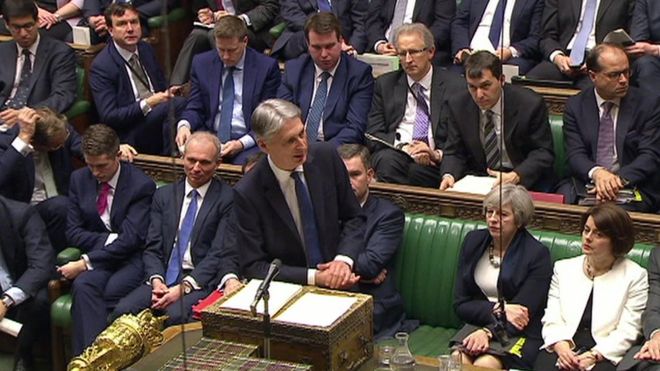
Chancellor Philip Hammond has used his first Budget to help prepare Britain for a "new chapter" in its history after Brexit.
Described as an "upbeat" speech, he said the economy has proved resilient since the referendum but admits that many families are "feeling the pinch".
Hammond says the economy has continued to confound the commentators with robust growth.
He says the budget extends opportunity to the young, delivers investment in public service and continues the task of getting Britain to live within its means.
Business rates
However, of particular concern in the rural sector is the issue of business rates.
Business rates raise £25bn a year, the Chancellor says. He has revealed three new measures in the Budget:
• Any business coming out of small business rate relief will benefit from an extra cap - meaning their rates will not increase by more than £50 a month.
• There will be a £1,000 discount on business rate bills for all pubs with rateable value of less than £100,000 - 90% of all pubs.
• A £300m fund will be made available to councils to allow them to provide a hardship fund to those worst affected.
Hammond says, taken together, this amounts to a further £435m cut in business rates.
While retailers and commercial occupiers have been vocal on the impact of the 2017 business rates re-evaluation, the changes that are scheduled to come into effect in April will increase the strain on some rural businesses, says Tim Jones, head of rural at Carter Jonas.
"This is particularly relevant where farmers have diversified, such as opening a farm shop, and are now facing very significant rate rises," he said.

'Flawed' rates system
Landowner organisation the CLA said businesses across the countryside are facing a hike in their tax bills as a result of a 'flawed' rates system that is in 'urgent need of review.'
CLA President Ross Murray said: “We believe the Chancellor has listened to us. He is taking action to help those small rural businesses who as a result of the 2017 revaluation no longer qualify for rates relief. The introduction of a cap is not the same as the 100% discount we called for but it is welcome.
“We are keen to see the details of the fund for discretionary relief as it is important this leads to opportunities for rural councils to help the worst affected rural businesses. However, these interventions are limited and leave thousands of rural businesses facing unaffordable rates hikes from 1 April.”
Mr Murray continued: “The Chancellor also said nothing about the looming problem of processing business rates appeals. We expect to see thousands of inaccurate valuations challenged and it is not clear the Valuation Office is prepared to deal with these quickly and fairly.”
Personal taxation
The main rate of National Insurance contributions for the self-employed is to increase from 9% to 10% in April 2018 and 11% in April 2019.
The increases, which will apply to earnings under £43,000, will raise £145m a year by 2021-22 at an average cost of 60p a week to those affected. All Class 4 earnings above £43,000 will continue to be taxed at 2%.
Class 2 National Insurance, a separate flat rate contribution paid by self-employed workers making a profit of more than £5,965 a year, is to be scrapped as planned in April 2018.
Taken together, millions of self-employed workers could pay an average of £240 a year more but ministers say those earning £16,250 will pay less.
The National Farmers Union has said the rise in National Insurance Contributions for the self-employed by 1% next year and a further 1% the year after will have a 'detrimental impact' for farmers.
NFU Mutual agreed with the NFU, and said the higher NI contributions will give farmers, self-employed farm workers and contractors 'further burden'.
“This will add a further financial burden to the thousands of farmers, contractors and rural service providers who have self-employed status”, said Sean McCann, Chartered Financial Planner at leading rural insurer, NFU Mutual.
National Living Wage
The national living wage will rise to £7.50 in April, the Chancellor has confirmed.
And the personal allowance will rise for the seventh year in a row, and the higher rate threshold will rise too.
Hammond says the government remains committed to increasing the tax threshold to £12,500, and the higher rate threshold to £50,000 by the end of this parliament.
The horticultural sector has previously warned of the damaging aspects a rise in the National Living Wage could be, putting the future of British fruit farmers at risk and threatening to wipe out 58% of growers' profits.
£700m support for robotics, 5G and broadband
The Chancellor has announced over £700m to boost the British science sector and bolster high-tech industries in the UK, which in turn will help agriculture with the newest technologies available.
The aim is to support “trailblazers” in sectors like 5G, electric vehicles, such as those making an appearance in agriculture , robotics, and artificial intelligence (AI).
The Chancellor has announced £300m for research talent, including 1,000 PhD places for STEM (Science Technology Engineering and Maths) subjects.
The Chancellor is to also make £270m available to boost the ability to operate in the most extreme and hazardous environments by developing AI, and robots, for off-shore and nuclear energy, agriculture, space, and deep mining.
He also says there will be £200m for projects to get private sector investment in full-fibre broadband networks, and £16m for a 5G mobile technology hub.
The rural sector has previously said there is a considerable amount to be done to ensure that everybody who lives and works in rural Britain has access to effective broadband and mobile connectivity.
Despite commitments to some fields of science and engineering, there was no reference to the importance of the low carbon sector, noted renewable energy organisation Aldersgate Group.
Nick Molho, Executive Director of Aldersgate, said the UK needs more ambition on clean tech to be at the cutting edge of a global economy.
He said: “It was positive to see lots of focus in today’s budget on supporting innovative businesses and ensuring the UK’s workforce has the skills it needs to benefit from the job opportunities of the future.
“But despite the fact that some of our key trading partners such as China are investing heavily in renewable energy and other clean technologies, there was no reference to the importance of the low carbon sector to the future competitiveness of the UK economy.”
T-Levels
The Chancellor has announced the introduction of T-Levels, which will replace 13,000 qualifications with just 15.
He also says the number of hours training for 16-19 year old technical students will increase by over 50%.
The new qualifications will include a high-quality 3 month work placement for every student, which could see more young people having hands on learning in agriculture and related sectors.
Full NFU response
National Farmers Union (NFU) has said that there were 'few measures' in today’s Budget to help create an environment that supports profitable, progressive and competitive farm businesses.
NFU President Meurig Raymond said: “The Chancellor’s announcement on capping business rates increases will be welcome news to members with small diversified farming businesses.
“However, the rise in National Insurance Contributions for the self-employed by 1% next year and a further 1% the year after will have a detrimental impact for farmers. The NFU is striving to make Government aware of the implications this will have on the sector.
“We are still very concerned about Government proposals on Making Tax Digital. While we welcome the announcement that it will be delayed until April 2019 for businesses under the VAT threshold1, many of our members will still be impacted with a costly and burdensome process of accounting from April next year.
“Many farmers will feel that this Budget was a missed opportunity, particularly that the Chancellor did not see fit to extend capital allowances as part of the Government’s productivity plans. Farming needs to invest to increase productivity so it can compete post-Brexit.”
